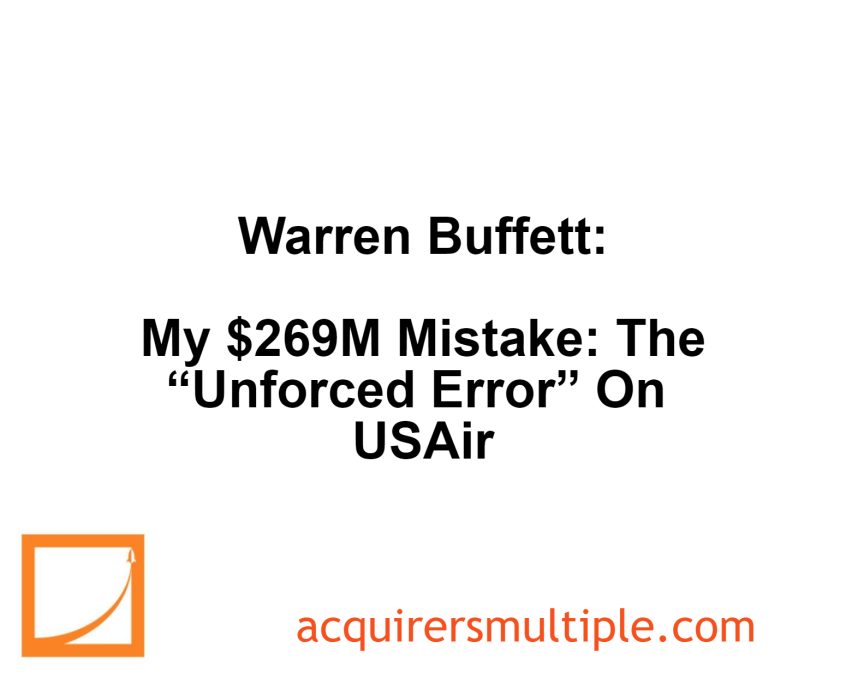In his 1994 Berkshire Hathaway Annual Letter, Warren Buffett discussed his mistake in purchasing USAir preferred stock for $358 million, on which the dividend was suspended. He admits that it was a case of sloppy analysis and hubris. He failed to focus on the problems that would inevitably beset a carrier whose costs were both high and extremely difficult to lower. The total write down was $269 million.
Here’s an excerpt from the letter:
Egregious as it is, the Cap Cities decision earns only a silver medal. Top honors go to a mistake I made five years ago that fully ripened in 1994: Our $358 million purchase of USAir preferred stock, on which the dividend was suspended in September.
In the 1990 Annual Report I correctly described this deal as an “unforced error,” meaning that I was neither pushed into the investment nor misled by anyone when making it. Rather, this was a case of sloppy analysis, a lapse that may have been caused by the fact that we were buying a senior security or by hubris. Whatever the reason, the mistake was large.
Before this purchase, I simply failed to focus on the problems that would inevitably beset a carrier whose costs were both high and extremely difficult to lower.
In earlier years, these life-threatening costs posed few problems. Airlines were then protected from competition by regulation, and carriers could absorb high costs because they could pass them along by way of fares that were also high.
When deregulation came along, it did not immediately change the picture: The capacity of low-cost carriers was so small that the high-cost lines could, in large part, maintain their existing fare structures. During this period, with the longer-term problems largely invisible but slowly metastasizing, the costs that were non-sustainable became further embedded.
As the seat capacity of the low-cost operators expanded, their fares began to force the old-line, high-cost airlines to cut their own. The day of reckoning for these airlines could be delayed by infusions of capital (such as ours into USAir), but eventually a fundamental rule of economics prevailed: In an unregulated commodity business, a company must lower its costs to competitive levels or face extinction. This principle should have been obvious to your Chairman, but I missed it.
Seth Schofield, CEO of USAir, has worked diligently to correct the company’s historical cost problems but, to date, has not managed to do so. In part, this is because he has had to deal with a moving target, the result of certain major carriers having obtained labor concessions and other carriers having benefitted from “fresh-start” costs that came out of bankruptcy proceedings. (As Herb Kelleher, CEO of Southwest Airlines, has said: “Bankruptcy court for airlines has become a health spa.”) Additionally, it should be no surprise to anyone that those airline employees who contractually receive above-market salaries will resist any reduction in these as long as their checks continue to clear.
Despite this difficult situation, USAir may yet achieve the cost reductions it needs to maintain its viability long-term. But it is far from sure that will happen.
Accordingly, we wrote our USAir investment down to $89.5 million, 25 cents on the dollar at yearend 1994. This valuation reflects both a possibility that our preferred will have its value fully or largely restored and an opposite possibility that the stock will eventually become worthless. Whatever the outcome, we will heed a prime rule of investing: You don’t have to make it back the way that you lost it.
The accounting effects of our USAir writedown are complicated. Under GAAP accounting, insurance companies are required to carry all stocks on their balance sheets at estimated market value. Therefore, at the end of last year’s third quarter, we were carrying our USAir preferred at $89.5 million, or 25% of cost. In other words, our net worth was at that time reflecting a value for USAir that was far below our $358 million cost.
But in the fourth quarter, we concluded that the decline in value was, in accounting terms, “other than temporary,” and that judgment required us to send the writedown of $269 million through our income statement. The amount will have no other fourth-quarter effect. That is, it will not reduce our net worth, because the diminution of value had already been reflected.
Charlie and I will not stand for reelection to USAir’s board at the upcoming annual meeting. Should Seth wish to consult with us, however, we will be pleased to be of any help that we can.
You can read the entire letter here:
For all the latest news and podcasts, join our free newsletter here.
Don’t forget to check out our FREE Large Cap 1000 – Stock Screener, here at The Acquirer’s Multiple:





One Comment on “Warren Buffett: My $269M Mistake: The “Unforced Error” On USAir”
I found myself engrossed in the article’s narrative, which is a testament to the author’s storytelling skills.